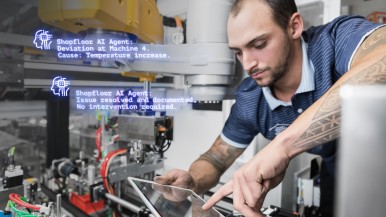To remain competitive in times of change, companies have to develop new forms and curricula for their associates’ occupational training and further professional development. Bosch started preparing itself for the transformation in the automotive industry early on, and is well positioned with a leading position in electromobility, comprehensive training programs, and the development of new business areas and markets. In 2018, the company laid the foundation for a comprehensive training initiative (Mission to Move) to qualify associates for new tasks in growth areas such as electromobility, software, data analysis, and artificial intelligence.
Mission to Move: On-demand training and training specifically for new posts
Transfer qualification at Bosch
So far, more than 1,000 associates have received training to qualify them for specific new tasks or positions. Most of them are engineers, but other highly qualified people have also taken part starting in 2020.
Worldwide approach
The digital transformation is creating a powerful incentive to quickly build up new knowledge and new capabilities. That is why the programs are constantly being adjusted to meet regional needs as well. To date, Bosch associates at more than 40 locations in some 20 countries have participated in Mission to Move. Roughly one-quarter of the participants come from locations outside Germany.
Contents
The program portfolio now covers three areas with ten learning programs in different formats:
- Electrification for engineers and skilled workers
- Software qualification
- Big data with data science, data analytics, and data engineering
In-house and external partners
In these endeavors, Bosch works with in-house partners such as the Bosch Learning Company and the company’s apprenticeship unit, as well as with the Chamber of Commerce and Industry and the universities of Stuttgart, Aalen, and Ingolstadt. The length of these courses varies depending on the program.
Individual programs
Electrification
This program is designed for associates switching to the electromobility field. In a seven-week program, associates spend three days a week familiarizing themselves with subjects such as e-mobility concepts, battery technologies, power electronics, and software. Participants can learn more about these subjects in practical training modules lasting several days. The basic theory is taught by the apprenticeship unit, which has now evolved into a technical training campus for subject matter relating to electrification. The program aims to qualify associates for jobs such as a design engineer for 48-volt batteries and project manager for power electronics.
Software
These two programs offer software training for associates from hardware-related units. The “intense” program lasts between 10 and 12 weeks, and comprises four 60-minute modules. The “long-term” program, by contrast, spans an 11-month period and comprises eight modules. Here as well, the program covers both theory and practice. In small groups, participants visit partner universities to learn basic theory. This will then qualify them for jobs in areas such as software and systems engineering as well as software function development. Bosch is continuously evaluating its requirements for the necessary skills, so that it can take further steps to qualify people for new jobs.
Big data
In these programs, associates with in-depth specialist knowledge in the mobility field learn and familiarize themselves with additional skills relating to the storage, processing, and analysis of big data, and how this improves the quality and efficiency of products and processes and provides the basis for developing new data-based business models.
Qualification as an industrial electrician
Mechanics are trained to become industrial electricians certified by the chamber of commerce. The engineers and other skilled workers taking part are closely supervised to ensure that the programs are a success. Mentors, the sense of community in the small study groups, the alumni network, and concurrent familiarization with the new jobs that await the participants provide additional support and motivation. Roughly 95 percent of participants complete the course.





